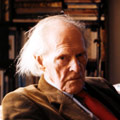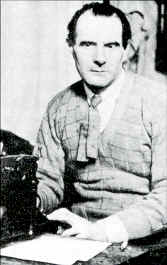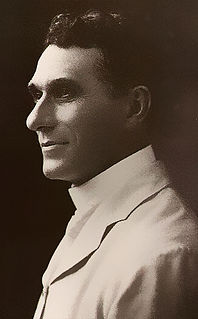A Quote by R. S. Thomas
The nearest we approach God ...is as creative beings. The poet, by echoing the primary imagination, recreates. Through his work he forces those who read him to do the same, thus bringing them... nearer to the actual being of God as displayed in action.
Related Quotes
Is America a land of God where saints abide for ever? Where golden fields spread fair and broad, where flows the crystal river? Certainly not flush with saints, and a good thing, too, for the saints sent buzzing into man's ken now are but poor-mouthed ecclesiastical film stars and clich?-shouting publicity agents. Their little knowledge bringing them nearer to their ignorance, ignorance bringing them nearer to death, but nearness to death no nearer to God.
Our work is not to save souls, but to disciple them. Salvation and sanctification are the work of God's sovereign grace, and our work as His disciples is to disciple others' lives until they are totally yielded to God. One life totally devoted to God is of more value to Him than one hundred lives which have been simply awakened by His Spirit. As workers for God, we must reproduce our own kind spiritually, and those lives will be God's testimony to us as His workers. God brings us up to a standard of life through His grace, and we are responsible for reproducing that same standard in others.
Every trial a man goes through, if he is faithful in that trial and does honor to God and his religion he has espoused, at the end of that trial or affliction that individual is nearer to God, nearer in regard to the increase of faith, wisdom, knowledge and power, and hence is more confident in calling upon the Lord for those things he desires.
God's wrath is not an implacable, blind rage. However emotional it may be, it is an entirely reasonable and willed response to offenses against his holiness. But his love . . . wells up amidst his perfections and is not generated by the loveliness of the loved. Thus there is nothing intrinsically impossible about wrath and love being directed toward the same individual or people at the same time. God in his perfections must be wrathful against his rebel image-bearers, for they have offended him; God in his perfections must be loving toward his rebel image-bearers, for he is that kind of God
The thing that was forfeited in the garden was regained. God gave him [Adam] dominion over the works of His hand. God made him His understudy, His king to rule over everything that had life. Man was master, man lived in the realm of god. He lived on terms of equality with God. God was a faith God. All God had to do was to believe that the sun was, and the sun was. All God had to do was to believe that the planets would be, and they were. Man belonged to God's class of being - a faith man, And he lived in the creative realm of God
Without out suffering, our work would just be social work, very good and helpful, but it would not be the work of Jesus Christ, not part of the Redemption. All the desolation of the poor people, not only their material poverty, but their spiritual destitution, must be redeemed. And we must share it, for only by being one with them can we redeem them by bringing God into their lives and bringing them to God.
Everyone is creative, but me and my colleagues are using a different definition of creativity than is implied when people say they are not creative. We believe that people are being creative if they are bringing out their highest inner resources to improve their lives and those around them. Those who are living from their core, and doing what they are destined to do, are being creative, no matter how mundane their work or profession might seem.
Imagination helps you to recognize the reality of facts, but then to go beyond them, to penetrate beneath them, to rise above them in your search for creative answers to problems. Imagination "stirs up the gift of God in thee." Through your imagination you touch and express the inspiration of the Infinite. Imagination, in the words of Shakespeare, "gives to airy nothing a local habitation and a name." You reach into the heavens to grasp an idea, then you bring it down to earth and make it work.
God Himself - His thoughts, His will, His love, His judgments are men's home. To think His thoughts, to choose His will, to judge His judgments, and thus to know that He is in us, with us, is to be at home. And to pass through the valley of the shadow of death is the way home, but only thus, that as all changes have hitherto led us nearer to this home, the knowledge of God, so this greatest of all outward changes - for it is but an outward change - will surely usher us into a region where there will be fresh possibilities of drawing nigh in heart, soul, and mind to the Father of us all.
...a human being not only can choose but... he must choose... for in this way God retains His honor while at the same time has a fatherly concern for humankind. Though God has lowered Himself to being that which can be chosen, yet each person must on his part choose. God is not mocked. Therefore the matter stands thus: If a person avoids choosing, this is the same as the presumption of choosing the world.
A poet is wounded into speech, and he examines these wounds, meticulously, to discover how to heal them. The bad poet harangues at the pain and yowls at the weapons that lacerate him; the great poet explores the inflamed lips of ruined flesh with ice-caked fingers, glittering and precise; but ultimately his poem is the echoing, dual voice reporting the damages.






































